 Petzlover
Petzlover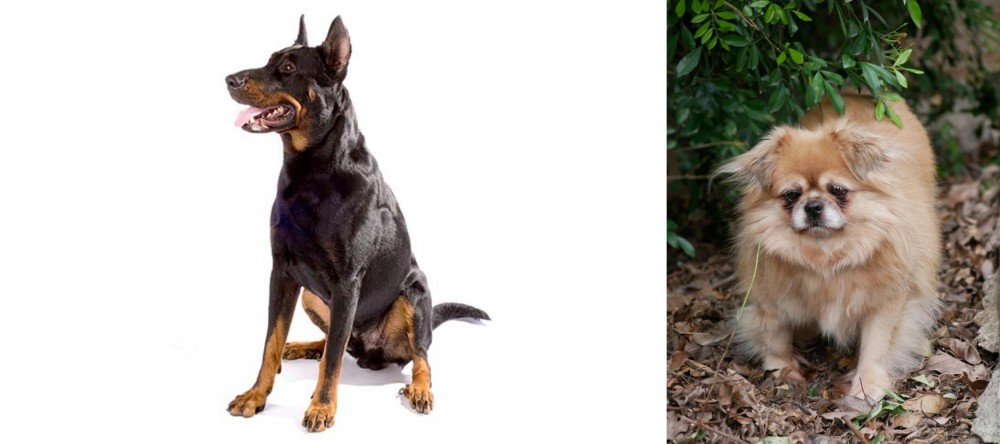 Beauceron is originated from France but Tibetan Spaniel is originated from China. Beauceron may grow 41 cm / 17 inches higher than Tibetan Spaniel. Beauceron may weigh 43 kg / 95 pounds more than Tibetan Spaniel. Both Beauceron and Tibetan Spaniel has almost same life span. Both Beauceron and Tibetan Spaniel has almost same litter size. Beauceron requires Low Maintenance. But Tibetan Spaniel requires Moderate Maintenance
Beauceron is originated from France but Tibetan Spaniel is originated from China. Beauceron may grow 41 cm / 17 inches higher than Tibetan Spaniel. Beauceron may weigh 43 kg / 95 pounds more than Tibetan Spaniel. Both Beauceron and Tibetan Spaniel has almost same life span. Both Beauceron and Tibetan Spaniel has almost same litter size. Beauceron requires Low Maintenance. But Tibetan Spaniel requires Moderate Maintenance
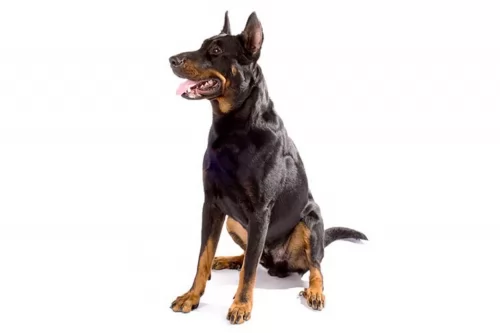 Sometimes referred to as the king of sheepdogs, the Beauceron is a French dog breed that happens to be an extraordinary herding dog too. He instinctively rounds up livestock without even being trained to do so. The dog is also known as Berger de Beauce, originating from the Beauce region in France and is closely related to the Briard or Berger de Brie.
Sometimes referred to as the king of sheepdogs, the Beauceron is a French dog breed that happens to be an extraordinary herding dog too. He instinctively rounds up livestock without even being trained to do so. The dog is also known as Berger de Beauce, originating from the Beauce region in France and is closely related to the Briard or Berger de Brie.
This French breed’s origin goes back to the late 16th century, and the Beauceron was divided into two working types way back in 1863 - the dog with the long coat was known as Berger de Brie or Briard while the short-coated dog became known as Beauceron. It was in 1922 that a club for this dog breed was established, and the Beauceron Club of America was established in 1980, only recently receiving recognition by the American Kennel Club.
 Known fondly as the Tibbie and being referred to as little lions’, the Tibetan Spaniel is an ancient dog breed.
Known fondly as the Tibbie and being referred to as little lions’, the Tibetan Spaniel is an ancient dog breed.
They appear in ancient art dating way back to 1100BC. This tells you that this small dog has been around for a jolly long time.
When you look at him, you can see that his predecessors were the Pekingese and the Lhaso Apso. It’s odd actually that he is called spaniel, as he doesn’t look like a spaniel at all and he has certainly never been a gun dog. He is more of a companion breed.
Even today, you’ll find these dogs living with monks in monasteries. The American Kennel Club recognized the breed in 1984.
 The Beauceron is an intelligent dog, just by looking at the alert, bright face. He is a muscular, large dog breed, standing up to 71cm in height and weighing in at up to 50kg. You’ll recognize him with his dark black coat with red markings, particularly around the feet, which interestingly gives this breed the French nickname Bas Rouge. It means red stockings. Harlequin, tri-coloured grey, black and tan is also recognized as a color.
The Beauceron is an intelligent dog, just by looking at the alert, bright face. He is a muscular, large dog breed, standing up to 71cm in height and weighing in at up to 50kg. You’ll recognize him with his dark black coat with red markings, particularly around the feet, which interestingly gives this breed the French nickname Bas Rouge. It means red stockings. Harlequin, tri-coloured grey, black and tan is also recognized as a color.
The coat is rough, short and dense, the alert eyes dark brown and the ears are set high and can be cropped or natural. The natural ears are half pricked or drop ears and are fairly short. Looking similar to the Doberman and Rottweiler but with a long tail, this French Shepherd dog is somewhat slimmer but with a foreboding appearance. He is solid, well proportioned and well muscled and gives the impression of strength. He has a tolerant nature and will fit in well with a family when trained and socialized.
 Weighing between 4 to 7kg and standing at 23 to 30cm, the silky, double coat is fairly long and it sheds throughout the year.
Weighing between 4 to 7kg and standing at 23 to 30cm, the silky, double coat is fairly long and it sheds throughout the year.
The coat can be any color really, from tan to cream to brown and black and even a mix of colors.
The eyes are dark brown, the ears medium length and feathery and the tail is long and feathery too. The nose is fairly short and blunt.
The Tibetan spaniel is a small, active dog breed but not known to be shy or timid. He is an assertive dog, and intelligent too.
He would be better off having training and socialization as he is strong willed, stubborn and independent. He is loving, sweet and devoted to his owners.
He makes a good watchdog dog and will adapt well to life in the city or in the countryside. He can be both social and aloof, enjoying having his human family around him even though he may not be interacting with them.
He is playful and gets on well with children in the home as well as with other pets. He makes an excellent pet for older people too – he just needs to get his regular exercise.
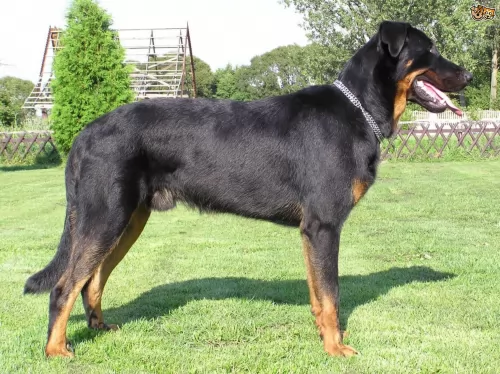 Strong, big, confident and good-looking the Beauceron makes an excellent watchdog, guarding the human family that he is so devoted too. He is a good friend and companion and is tolerant with children and other pets.
Strong, big, confident and good-looking the Beauceron makes an excellent watchdog, guarding the human family that he is so devoted too. He is a good friend and companion and is tolerant with children and other pets.
He is such a clever breed too, and its small wonder that he has always been sought after for hard work – herding, shepherding and even rescue work. When he’s not involved in working, at home, he’s just your big, devoted friend.
 The Tibetan Spaniel dog is energetic and active, but doesn't require a lot of exercise. This makes him suitable for life in the city as well as the countryside.
The Tibetan Spaniel dog is energetic and active, but doesn't require a lot of exercise. This makes him suitable for life in the city as well as the countryside.
They’re social dogs and will relish any interaction with their human family. Give him the love and care he deserves and you’ll be rewarded with a loyal, loving friend.
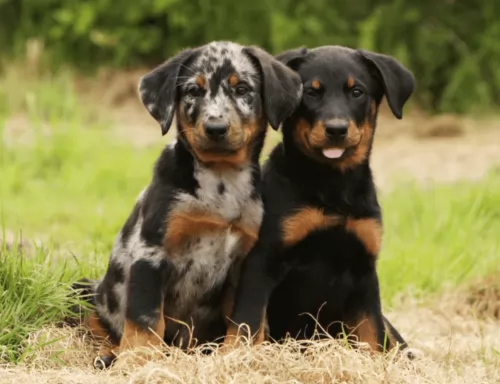 It’s such a nice strong, good-looking dog this, you can’t think of anything going wrong with him. His lifespan is anything from 10 to 14 years and the dog is pretty robust. Being a large breed and a pedigree, he is prone to some common ailments. When you suspect your beloved pet has any health issue, don’t hesitate to get him to the vet.
It’s such a nice strong, good-looking dog this, you can’t think of anything going wrong with him. His lifespan is anything from 10 to 14 years and the dog is pretty robust. Being a large breed and a pedigree, he is prone to some common ailments. When you suspect your beloved pet has any health issue, don’t hesitate to get him to the vet.
A painful disorder that affects larger dogs and brought about by an abnormal development in the joints.
Also a painful condition where the stomach twists so that the blood supply is cut off. Large breeds with deep chests are more prone to developing the condition. Rapid breathing and signs of pain can be indicative of this ailment.
 Tibetan Spaniels are generally healthy, especially if you provide them with good food and exercise.
Tibetan Spaniels are generally healthy, especially if you provide them with good food and exercise.
Whenever you’re looking to buy a puppy, make sure that you do research on where the puppy comes from. You don’t want to bring your puppy home and find that you’re faced with a host of health problems.
This eye problem effects photoreceptor cells which deteriorate over time and ultimately lead to blindness. It is an inherited disease that occurs in quite a few different breeds of dogs.
Dogs with this disease should never be bred. It isn’t a painful condition but you usually notice it when your dog has night blindness. Day blindness also occurs and later on cataracts can develop too.
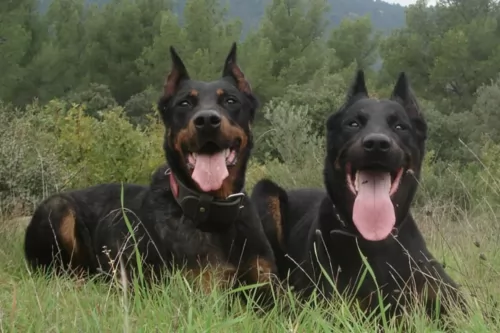 This is a large, hard-working, energetic dog and he will need high-quality food, whether commercially manufactured or home-prepared. The best commercially manufactured dog foods produce foods with the right balance of minerals and vitamins in keeping with your dog’s age, his activities and his stage of life (illness, senior, puppy). If you’re unsure about what to feed your Beauceron, speak to your vet to be 100% that you are meeting his nutritional demands, and always ensure a bowl of cool, clean water is constantly available.
This is a large, hard-working, energetic dog and he will need high-quality food, whether commercially manufactured or home-prepared. The best commercially manufactured dog foods produce foods with the right balance of minerals and vitamins in keeping with your dog’s age, his activities and his stage of life (illness, senior, puppy). If you’re unsure about what to feed your Beauceron, speak to your vet to be 100% that you are meeting his nutritional demands, and always ensure a bowl of cool, clean water is constantly available.
You’re lucky with the Beauceron as he is a low shedding, low maintenance dog with his short coat. He doesn’t require any trimming but will need a good brush twice a week to rid him of loose hairs. Clean his teeth with a special dog toothbrush and toothpaste to avoid plaque buildup. Never use human toothpaste. Clip his nails if he doesn’t wear them down naturally.
This is a big, strong, energetic dog, and you owe it to him to ensure he gets lots of exercise – runs, walks and ball games. If you can’t be a responsible dog owner, don’t own a breed like this as he can become destructive if not kept active.
 The Tibetan Spaniel isn’t fixated on games and exercise like some other dog breeds are, but even so he isn’t a couch potato either. He will certainly require some moderate exercise such as a good walk every day.
The Tibetan Spaniel isn’t fixated on games and exercise like some other dog breeds are, but even so he isn’t a couch potato either. He will certainly require some moderate exercise such as a good walk every day.
You canine friend relies on you to make good food choices for him. Just like human beings have to watch what they eat if they want to remain healthy, dogs can’t just eat anything.
Feeding him an inferior diet will allow sickness. Commercially manufactured dog foods should be chosen with care, and there is a lot of information on the packaging to guide you.
Getting enough minerals and vitamins is imperative for good health. You should also try to give him some simplistic home-made food, while steering clear of toxic foods that could give your pet a whole lot of digestive problems. These are things like chocolates, crisps, peanuts, grapes, onions and spicy, exotic foods.
Just stick to simple, nutritious foods such as boiled chicken, brown rice and vegetables.
• Tibetan Spaniels will benefit from early socialization and training because then they become obedient and well mannered to have around with you wherever you go.
• Get your pet to the vet when he’s sick. As it is, he will need vaccines against serious pet illnesses as a puppy.
• Provide general grooming – a brush twice a week, checking inside the ears for redness, checking the eyes and checking for any unusual lumps.